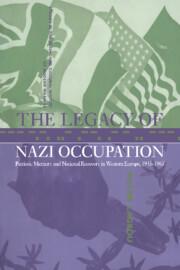Book contents
- Frontmatter
- Contents
- List of illustrations
- Acknowledgements
- List of abbreviations
- Introduction
- Part I Troublesome heroes: the post-war treatment of resistance veterans
- Part II Repatriating displaced populations from Germany
- Part III The legacy of forced economic migration
- Part IV Martyrs and other victims of Nazi persecution
- Conclusion
- Bibliography
- Index
Conclusion
Published online by Cambridge University Press: 02 December 2009
- Frontmatter
- Contents
- List of illustrations
- Acknowledgements
- List of abbreviations
- Introduction
- Part I Troublesome heroes: the post-war treatment of resistance veterans
- Part II Repatriating displaced populations from Germany
- Part III The legacy of forced economic migration
- Part IV Martyrs and other victims of Nazi persecution
- Conclusion
- Bibliography
- Index
Summary
The juxtaposition of three national case studies, with their inevitable and apparent differences, could easily lead to the conclusion that, even within Western Europe, national distinctiveness was, in the final analysis, primordial in shaping memories of the Second World War. This would contradict the hypothesis at the start of this book, that the fundamental differences in the Western European experience of the war were not national frontiers but particular experiences at the heart of this particular war: resistance, labour conscription, persecution. It is a rudimentary conclusion of this study that ‘national’ memories did exist in post-war years. How to deal with the memory of the war was a central challenge to the reconstruction of the State and to the continuing existence of the Nation, after their spectacular failures of the years 1939–45. The state became a central agent of a collective memory that was at the same time self-justification and recovery of national honour. This was a matter of survival. The state was the source and the destination of these memories.
In February 1945, in the midst of the last, cold ‘hunger winter’ of the German occupation of the Netherlands, an anonymous plan was presented to the National Resistance Council (the GAC) for the commemoration of the Dutch resistance. The idea was to erect a national monument at the very heart of Amsterdam, facing the royal palace in the Dam-square.
- Type
- Chapter
- Information
- The Legacy of Nazi OccupationPatriotic Memory and National Recovery in Western Europe, 1945–1965, pp. 292 - 306Publisher: Cambridge University PressPrint publication year: 1999



